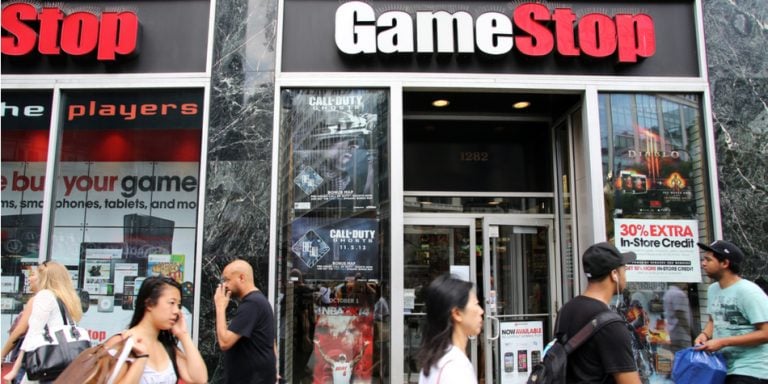Back in 2016, the digital transition was hitting the DVD rental business very hard. Everyone assumed that DVD-rental company Redbox and its parent company, Outerwall, would go belly-up; as a result, most investors threw in the towel, and Outerwall stock dropped to new lows. But the story ended happily for Outerwall, and a similar scenario may be unfolding for dying video-game-retailer GameStop (NASDAQ:GME).
In 2016, investment firm Apollo Management saved Outerwall. In the middle of that year, Apollo announced that it intended to acquire Outerwall for $1.6 billion. That price tag represented a 50% premium on Outerwall’s market cap prior to the launch of M&A talks. So Outerwall investors who bought the dip and waited for a buyout made a profit and ended up happy.
The same thing might happen in 2019 to the owners of GameStop stock.
Much like the digital transition that hit the DVD-rental business hard in 2016, the digital transition is walloping the physical video-game business just as hard today. Video-game players are downloading games. Consequently, they aren’t going to GameStop anymore, so investors are throwing in the towel, and GME stock has plunged to new lows.
That sounds a lot like what happened to Redbox in 2016.
There are more similarities between Redbox then and GameStop now. Rumors are starting to swirl, thanks to a
Wall Street Journal report, that Apollo, the same investment firm that bought out Redbox in 2016, is interested in acquiring GME. GameStop stock soared on the news.
Will Apollo actually buy GME? Maybe. The similarities between Redbox and GME are striking. If a deal does happen, $20 per share seems like the right price for GME, meaning that investors who buy the dip in GME stock could become profitable and happy in 2019.
The Similarities Support a Buyout
At first glance, the obvious reaction to GameStop M&A rumors is: who in the world would want to buy GME? I understand that reaction. GameStop is a dying business. But that was also the gut reaction to rumors about Redbox being acquired back in 2016, and Redbox was ultimately bought.
The logic is that, although both companies have dying businesses, they still have a few good years left. In those few good years, their businesses will produce enough cash flow to service the acquisition price, and then some. The “and then some” part is why private-equity firms make bets on dying public companies.
Apollo made a bet on Redbox back in 2016. That makes the current rumors that it might buy GameStop in 2019 more believable.
After all, the similarities between Redbox and GameStop are way too strong to ignore. Both GameStop and Redbox are being disrupted by the digital shift. But this digital shift is happening gradually, not all at once, so both of their businesses are slowly deteriorating, not being completely wiped out. Moreover, both companies generate $1 billion of revenue each year, have thousands of retail locations and strong brand-name recognition, are profitable, and produce hundreds of millions of dollars of free-cash-flow every year.
Thus, since Apollo was attracted to Redbox in 2016, it’s probably interested in GME in 2019.
$20 Per Share Makes Sense
If a buyout does happen, the price tag at which such an acquisition takes place will likely be around $20 per share of GME stock.
There are two ways to calculate the likely acquisition price. First, Redbox was acquired for $1.6 billion in 2016, and it produced about $250 million of free cash flow in 2015. That implies a free-cash-takeover multiple of 6.4.
GameStop’s revenue is higher than Redbox’s top line was, but GME’s margins are lower. (The free- cash-flow margins of Redbox’s parent exceeded 10% in 2014 and 2015, whereas GameStop’s free-cash-flow margins were under 5% in 2016 and 2017). Also, the digital-disruption cycle is more than two years further advanced now than when Redbox was acquired.
Given those factors, Apollo probably won’t pay more than six times free-cash flow for GME. GameStop’s free-cash flow was about $325 million in 2018. Placing a multiple of six on that yields a price tag of nearly $2 billion. There are about 100 million diluted shares of GME stock, equating to a $20 price tag per share of GME stock.
The other way of looking at this is that Redbox was taken out at a 50% premium to its price before M&A talks started. GameStop stock’s 50-day-moving average hovers around $13.50. A 50% premium on that equates to a takeover price tag of about $20 per share.
The Bottom Line on GME
There is finally a light at the end of the tunnel for the owners of GME stock. Although a takeover may not materialize, there are plenty of reasons to believe that it will. If it does, a $20-per-share-takeover price makes sense, implying that GME stock can jump about 30% from its current levels.
As of this writing, Luke Lango did not hold a position in any of the aforementioned securities.

